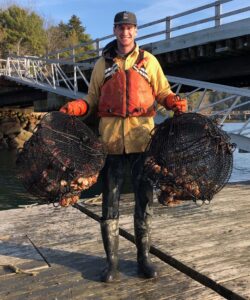Struan Coleman: Seeking solutions to strengthen coastal economies
This master’s student in marine science is helping to find better ways to farm sea scallops and diversify coastal livelihoods
 What problem/s are you working to solve?
What problem/s are you working to solve?
I am currently working on a project that aims to optimize the production process of sea scallop aquaculture in the state of Maine.
What progress are you making toward solutions?
We are tracking growth and performance of sea scallops at four different farm sites along the Maine coast in order to identify suitable culture methods, influential environmental growth factors, and best labor practices. Preliminary data show spatial and temporal variation in scallop growth, an important conclusion that will be used to make future aquaculture site selection recommendations.
How could your findings contribute to a sustainable future in Maine and beyond?
Maine’s working waterfront has always relied on diversification in order to remain resilient in the face of environmental, social and political changes. Sea scallop aquaculture provides a potentially profitable alternative revenue stream for coastal residents most susceptible to impacts from these types of disruptions. Additionally, regenerative shellfish farming provides ecosystem services to heavily trafficked watersheds by improving water quality through the removal of excess nutrients.
Why did you get involved with the Mitchell Center Strengthening Coastal Economies project?
This project offered the financial and informational resources of a diverse team made up of University of Maine graduate and undergraduate students, researchers and faculty. The opportunity to work and collaborate with such a group has been invaluable.
What do you like best about working on an interdisciplinary team? What is most challenging?
Working with an interdisciplinary team is an opportunity to think about your research in a different way. As a graduate student, I find that it’s easy to become too focused on one aspect of my project and miss the broader implications. Team members have offered input and suggestions on ways to formulate research questions that shed new light on my work. The challenge thus becomes translating those suggestions across disciplines.
What do you find rewarding about collaborating with stakeholders? Most challenging?
One of the best aspects of the sea scallop aquaculture project is the opportunity to learn from stakeholders. The fishermen and farmers with whom I work have an incredibly comprehensive understanding of their watersheds. Their questions and insights directly inform our research.
What sustains you?
The opportunity to help advance the aquaculture industry in Maine has been really awesome. I get to work on the water and learn from pioneers developing the market for a new shellfish product in the state. Knowing that this amazing team’s research is grounded within the larger field of sustainable food systems has been the most rewarding part of this experience.
Where do you hope to be in five years?
I think the most interesting part of Maine aquaculture is the stories of the independent fishermen and farmers who are on the leading edge of developing and refining sustainable production methods. My hope is that these stories play a central role as this industry develops. I would love to help tell those stories.
Struan Coleman
Home Department: School of Marine Sciences
Mitchell Center Research Project: Strengthening Coastal Economies
Research Advisor(s): Damian Brady
News Article: Strengthening Coastal Economies broadens shellfish focus to include oysters, scallops and mussels (June 4, 2020)
